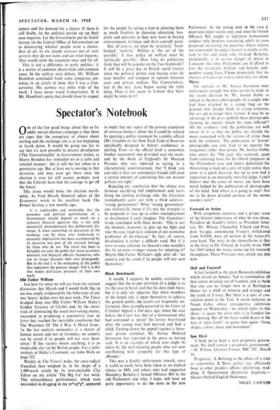Old Father William
Just how far away we still are from the rational discussion that Hirsch and I would both like to see was amply evidenced by the behaviour of our two 'heavy' dailies over the past week. The Times dredged deep into Old Father William Haley's Golden Treasury of Clichés and, by the clever trick of eliminating the usual intervening matter, succeeded in producing a journalistic tour de force that reached the inevitable conclusion that The Weakness Of The £ Was A Moral Issue: 'in the last analysis economics is a matter 9f human nature and not of formulas; no country can be saved if its people will not save them- selves.' If this vacuity means anything, it is an intolerable slur on the British people. For a fuller analysis of Haley's Comment, see John Wells on page 323.
Weakly in The Times's wake, the once-radical Guardian then weighed in, in the shape Ot a 1,400-word article by its over-excitable city Editor on my article 'The Big Lie' last week. This extraordinary performance, which even succeeded in dragging in my nertgsg*, appeared
to imply that my report of the private scepticism of overseas bankers about the £ could be refuted by quoting a public statement by a public official (Mr. Coombs of the New York Federal Reserve) specifically designed to bolster confidence in sterling. Even on the official level a somewhat franker assessment was provided over the week- end by the Bank of England's Sir Maurice Parsons, who was reported as saying, in a characteristic understatement, that 'I think you can take it that our continental friends still need a certain amount of convincing that our present policies are right.'
Rejecting my conclusion that the choice was between sacrificing full employment and sacri- ficing the sterling exchange rate, the Guardian triumphantly came out with a third solution : 'strong government.' What 'strong government' can realistically mean if it's not the strength to be prepared to face up to either unemployment or devaluation l can't imagine. The Guardian's tirade concluded with these words: 'This is not the moment, however, to give up the fight and take the easy road (to a solution of our economic problems) of devaluation.' In fact, of course, devaluation is rather a difficult road. But if it were an easy solution, for heaven's sake wouldn't this be an even stronger reason for adopting it? Maybe Old Father William's right after all: `no country can be saved if its people will not save themselves.'


































 Previous page
Previous page